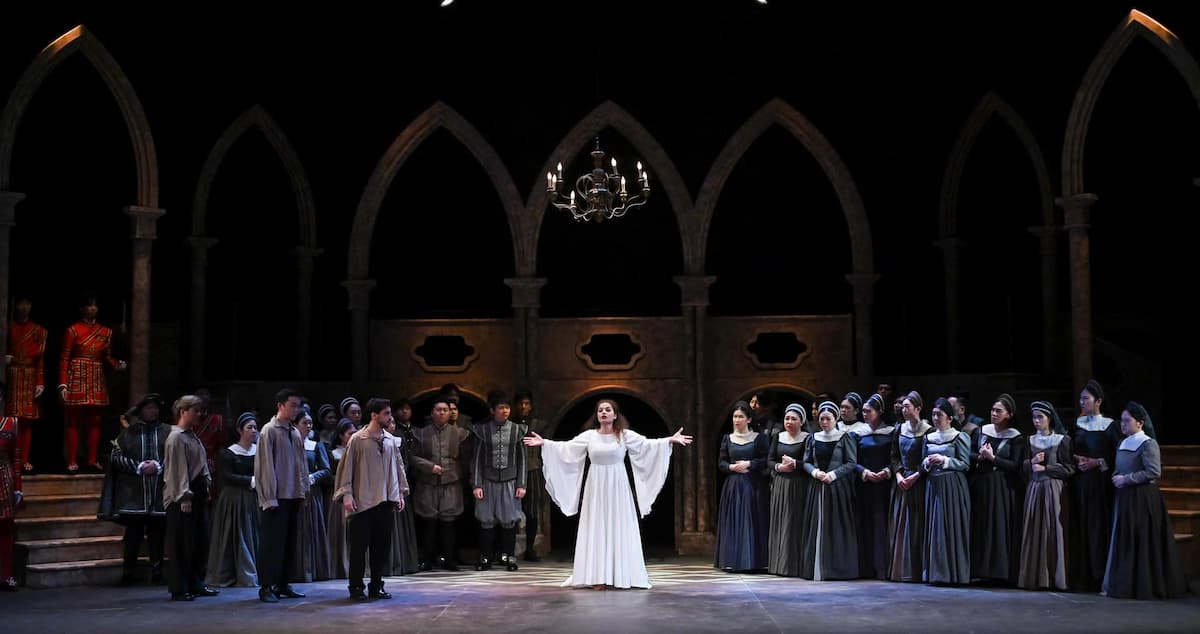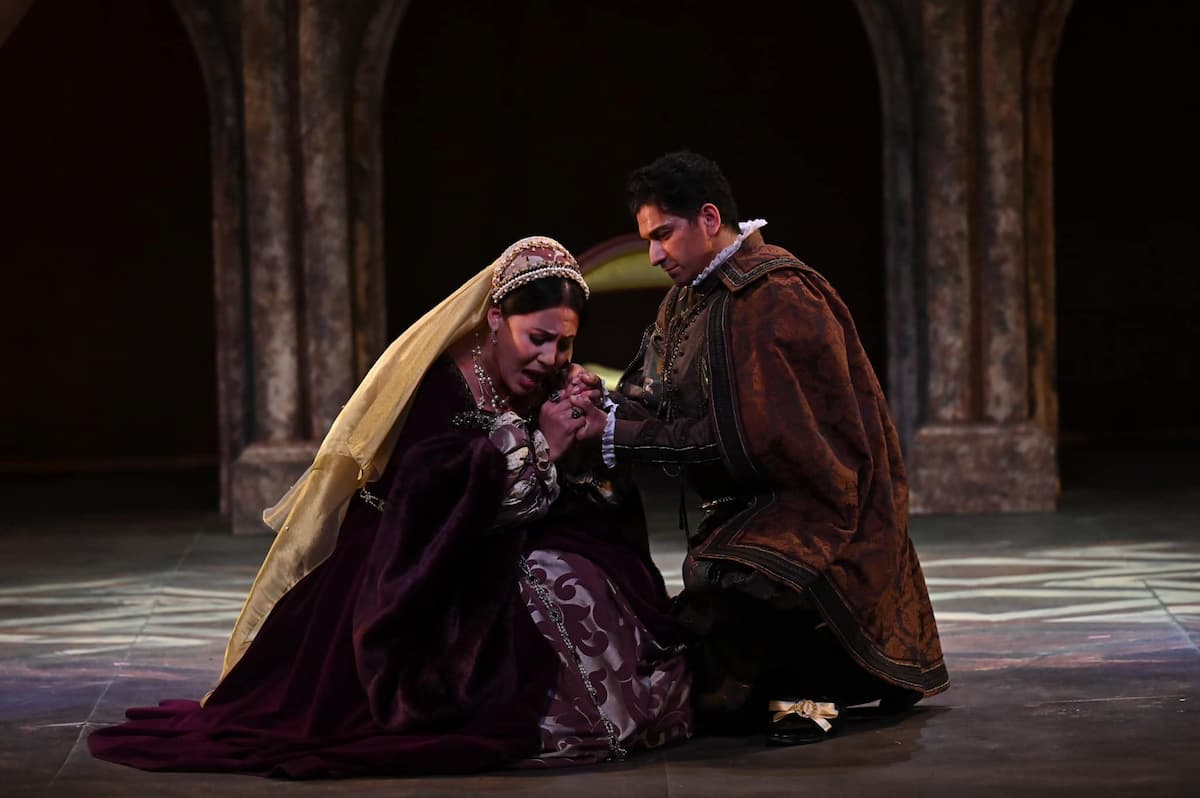Anna Bolena (Donizetti)
MusicaViva
Hong Kong City Hall, Concert Hall
8,9, 10 Dec 2023

MusicaViva’s Anna Bolena, December 2023 production © Musica Viva
Drawing inspiration from the shadowy corridors of power and passion, Donizetti’s wildly popular Anna Bolena shines a spotlight on the queen of England who met a tragic end. Arguably the most fascinating of Henry VIII’s wives, Anne Boleyn is also the star of this 1830 Italian opera that premiered at the Teatro Carcano in Milan 300 years after her death. Now, Mr. Lo Kingman of MusicaViva has handsomely mounted a production which, albeit conservative in interpretation, is nevertheless a welcome addition to Hong Kong’s generally staid opera scene.
The opera opens with Giovanna’s (Jane Seymour’s) aria (“Ella di me sollecita”), setting a tone of conflicted loyalties and forbidden love. As the curtain rises on a wooden throne situated front and centre, the audience is left with no doubt as to what the main theme of Bolena is: power, and the painful gaining and losing of it. Donizetti emphasizes the prominence of Anna’s rival Giovanna, whose character arc nevertheless seems to mirror that of Anna’s – a chilling foreshadowing of the cyclical nature of power and desire. Did Anne Boleyn ruthlessly destroy her precedent Katherine, or was she torn between loyalty and power, the way Jane seems to be in Donizetti’s opera? Did both women love the man or the throne, or were these things impossible to extricate?
Giovanna Seymour “Ella di me, sollecita” (Anna Bolena) – Hilary Ginther, Mezzo-Soprano
Soprano Lucrezia Drei, as the titular Anna, wields a soft-grained vocal instrument, which she employs with keen intelligence. The role of Anna Bolena is a Herculean one, demanding vocal athleticism that Drei has in spades. Her voice has a plummy beauty and a shimmer on top, and her careful pacing ensured that Anna’s complex character was conveyed with both strength and vulnerability throughout.
Mezzo-soprano Hilary Ginther’s Giovanna (Jane Seymour) was spectacular. With rich, even registers and a vocal brilliance that penetrates even in her quietest moments, Ginther embodies the heart-wrenching struggle between her love for Henry and her concern for Anna. Her performance—whether she is pensively stroking the curves of the throne or rapturously fixating on the glimmer of the royal ring–is a pleasure to experience.
Anna Bolena: “Coppia iniqua” (Anna Netrebko)
The performances by the men were a mixed bag. Tenor Manuel Amati’s portrayal of the ardent Riccardo Percy suffered from a nasality which robbed his tone of much of its beauty and power. However, this same placement did allow for agility in the faster passages, and there was ease in Amati’s high notes. The thankless role of Enrico—Henry VIII— was sung by Enrico Marabelli (baritone) with more force than finesse, which at its best made Enrico a domineering, hectoring lover. At its worst, the singing was unwieldy and lacking in clarity of pitch. This was particularly evident in his duet with Giovanna (“Tutta in voi la luce mia”) in which the fioriture was sadly lost.
Local baritone Kwok-Ho Lam, as Bolena’s brother Rochefort, made a fine impression with a noble physical and vocal presence. Tenor Henry Ngan’s Hervey – the King’s “fixer”– was the standout in the local cast, with his beautiful singing bringing a sense of humanity to a character that could easily have been rendered a caricature. Ngan’s Hervey is, above all, a man of duty, not malice, and despite a few squeezed high notes, his performance came as a welcome surprise.
Mezzo-soprano Carol Lin’s Smeton displayed initial wobbles in her cavatina (“Deh! Non voler costringere”); the intricate bel canto passages proved a challenge. Vocally, Smeton (a pants role) requires grace and surety to convince as a lovelorn court musician. Lin’s lower register, however, is undoubtedly beautiful, especially when she eases into it, and her recitatives were delivered with expressivity and magnetism that reaffirm her stature in the Hong Kong opera scene.
É sgombro il loco (Anna Bolena) | Tamara Mumford as Smeaton
The static arrangement of the chorus remains an issue, often undermining the dramatic potential of the scenes. While they sang ably, chorus members were often situated in two neat rows behind the main characters, as neat and prim as a church choir, seemingly dissociated from the drama unfolding before them. A more dynamic direction for the chorus would not have been amiss.
Andrew Cheung’s luxurious costumes in satin and velvet were certainly a feast for the eyes. Having said that, the production’s authenticity in costuming was marred by an odd sartorial choice in Act I in which Enrico appears in a ‘50s style dressing-gown-cum-smoking-jacket that clashed comically with the otherwise period-accurate attire. This anachronistic misstep breaks the historical immersion and leaves one questioning the intention behind this design decision.
The production’s conclusion is where the drama notably falters. Anna’s mad scene— a vocal highlight executed beautifully by Drei—lacked theatrical direction to differentiate delusion from reality, leaving the scene’s emotional impact muddled. For instance, as Drei plunged into her brutal aria (“Piangete voi? …Al dolce guidami castel natio”), one could not help but be thrown by the alienating sight of the aforementioned “church choir” arrangement for the chorus behind her. Additionally, the whole scene was bathed in warm yellow light, conveying neither terror nor pathos. Finally, after so much singing about the horrors of death, one would expect at least a glimpse of the execution block at the finale. Instead, Anna collapses into a small chair as the curtains came down. Thus the audience is robbed of the cathartic release the entire opera was building towards.

© Musica Viva
Under Jeff Leung’s direction, the orchestra provided a largely “straight” interpretation of the score. The overture was delivered briskly; here and there were moments of great beauty produced by the instrumentalists. More care needed to have been taken to support the singers – there were several instances of both forging forward and dragging back which hindered their breath, which in turn affected their line.
MusicaViva’s Anna Bolena offers a tale of two queens with performances that resonate, but ultimately, it is hindered by its unevenness in both vocal delivery and dramatic execution. While the efforts of local talent and sustained brilliance from the leading women provide some redemption, the production stumbles where it most needs to soar: a realm of potential majesty undermined by its own inconsistencies. However, MusicaViva must be commended for its bravery in bringing to Hong Kong such a challenging operatic work; one looks forward to more in the future.
Sylvia Woo is a writer based in Hong Kong. She is also an avid opera and theatre lover.
*This review was based on the evening performance on Saturday, 9th December. In the alternate cast (matinee 9, 10 Dec), Anna is sung by Marlena Devoe, Giovanna by Laura Krumm, Enrico by Burak Bilgili, Riccardo by Alok Kumar, Hervey by Dennis Lau, and Rochefort by Michael Lam.
For more of the best in classical music, sign up for our E-Newsletter




